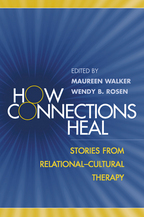How Connections Heal
Stories from Relational-Cultural Therapy
Edited by Maureen Walker and Wendy B. Rosen
Foreword by Jean Baker Miller
“How Connections Heal is an exemplary contribution to the all-too-scant literature that discusses clinical process from the viewpoint of both clients and therapists. The eleven case studies address a range of clinical modalities, including individual, couple, and group therapy, while also considering treatment approaches with women in prison, delinquent girls, and substance abusers. The authors’ interest in and ability to utilize an understanding of cultural variables is intrinsic to the treatment model, and is of particular value to mental health practitioners treating diverse clients. This book will be read and reread, both by graduate students in the various mental health fields and by experienced therapists who wish to advance their understanding of how treatment actually works. Regardless of the reader’s theoretical orientation, the book makes an impressive and eloquent argument for the value of studying case material in fine detail.”
—Gerald Schamess, MSS, Professor Emeritus, Smith College School for Social Work
“A major contribution to the psychotherapy literature. Superbly organized and written chapters present a rich and wide array of cases, providing articulate, powerful illustrations of how relational-cultural theory can be applied in practice. Up-close views of work with diverse clients include fascinating discussions of therapist self-reflection and the repair of therapeutic errors. Much more of a 'page turner' than one can usually hope for in a professional book, How Connections Heal presents therapeutic dilemmas with which readers will readily identify and shows how other therapists have resolved them, interweaving cultural and feminist perspectives throughout. This is a highly interesting and informative resource for new as well as seasoned psychotherapists.”
—Melba J. T. Vasquez, PhD, ABPP, private practice, Austin, Texas; past president, American Psychological Association Society for the Psychology of Women (Division 35) and Society of Counseling Psychology (Division 17)
“How Connections Heal delivers the crucial message that therapists can help or harm because of who we are and what we bring to our work, rather than because of an impersonal set of techniques we use with every client. If relational-cultural theory (RCT) is the 'why,' this book addresses the 'how,' presenting first-person accounts of the use of RCT in an impressively broad range of arenas, from individual psychotherapy to groups of women in prisons. Valuable reading for undergraduate- and graduate-level courses in psychotherapy, personality theory, and psychopathology.”
—Paula J. Caplan, PhD, Brown University, author of Don't Blame Mother and The Myth of Women's Masochism
Table of Contents
I. An Introduction to Relational-Cultural Theory and Practice1. How Relationships Heal, Maureen Walker
2. Relational Learning in Psychotherapy Consultation and Supervision, Judith V. Jordan
II. Connection, Disconnection, and Resilience in the Therapy Dyad
3. Walking a Piece of the Way: Race, Power, and Therapeutic Movement, Maureen Walker
4. Making Great Memories: Empathy, Derailment, and Growth, Wendy B. Rosen
5. Caring, but Fallible: A Story of Repairing Disconnections, Alice C. Lawler
6. Reflections on Life, Loss, and Resilience, Dana L. Comstock
III. Applications to Couple, Family, and Group Therapy
7. Me, Them, Us: Developing Mutuality in a Couple's Therapy, Cindy Walls
8. Moving toward "We": Promise and Peril, Karen Skerrett
9. The Five Good Things in Cross-Cultural Therapy, Roseann Adams
10. Relational Movement in Group Psychotherapy, Nikki Fedele
IV. Envisioning New Models of Effectiveness and Change: Relational Practices in Institutional Settings
11. Prevention through Connection: A Collaborative Approach to Women's Substance Abuse, Linda M. Hartling
12. Toward Relational Empowerment of Women in Prison, Yvonne M. Jenkins
13. Relational Experiences of Delinquent Girls: A Case Study, Elizabeth Sparks
About the Editors
Maureen Walker, PhD, a licensed psychologist, is the director of program development at the JBMTI and the associate director of MBA Support Services at Harvard Business School. She is a coeditor of The Complexity of Connection.Wendy B. Rosen, PhD, a licensed clinical social worker, is on the faculty of the JBMTI and on the attending staff of McLean Hospital. She is also an adjunct faculty member at Smith College School for Social Work.
Contributors
Roseann Adams, MSW, LCSW, Illinois Department of Children and Family Services and St. James Cathedral Counseling Center, Chicago, ILDana L. Comstock, PhD, Department of Counseling, St. Mary's University, San Antonio, TX
Nikki Fedele, PhD, Jean Baker Miller Training Institute, Wellesley College, Wellesley, MA; Brigham and Women's Hospital, Harvard Medical School, Boston, MA; private practice, Wayland, MA
Linda M. Hartling, PhD, Jean Baker Miller Training Institute, Wellesley College, Wellesley, MA
Yvonne M. Jenkins, PhD, University Counseling Services, Boston College, Boston, MA; Jean Baker Miller Training Institute, Wellesley College, Wellesley, MA; private practice, Brookline, MA
Judith V. Jordan, PhD, Jean Baker Miller Training Institute, Wellesley College, Wellesley, MA; Department of Psychiatry, Harvard Medical School, Boston, MA
Alice Lawler, PhD, private practice, Austin, TX
Wendy Rosen, PhD, Jean Baker Miller Training Institute, Wellesley College, Wellesley, MA; McLean Hospital, Belmont, MA; private practice, Cambridge, MA
Karen Skerrett, PhD, Chicago Center for Family Health and private practice, Chicago, IL
Elizabeth Sparks, PhD, Department of Counseling Psychology, Boston College, Boston, MA; Jean Baker Miller Training Institute, Wellesley College, Wellesley, MA
Maureen Walker, PhD, Jean Baker Miller Training Institute, Wellesley College, Wellesley, MA; private practice, Cambridge, MA
Cynthia Walls, MA, LCSW, St. James Cathedral Counseling Center and private practice, Chicago, IL
